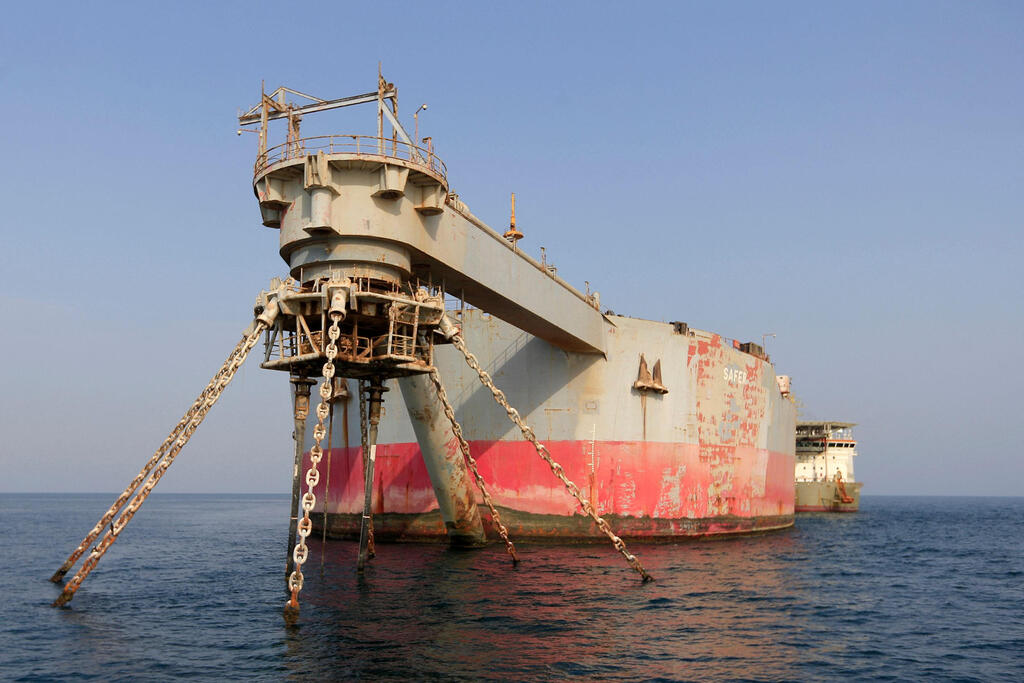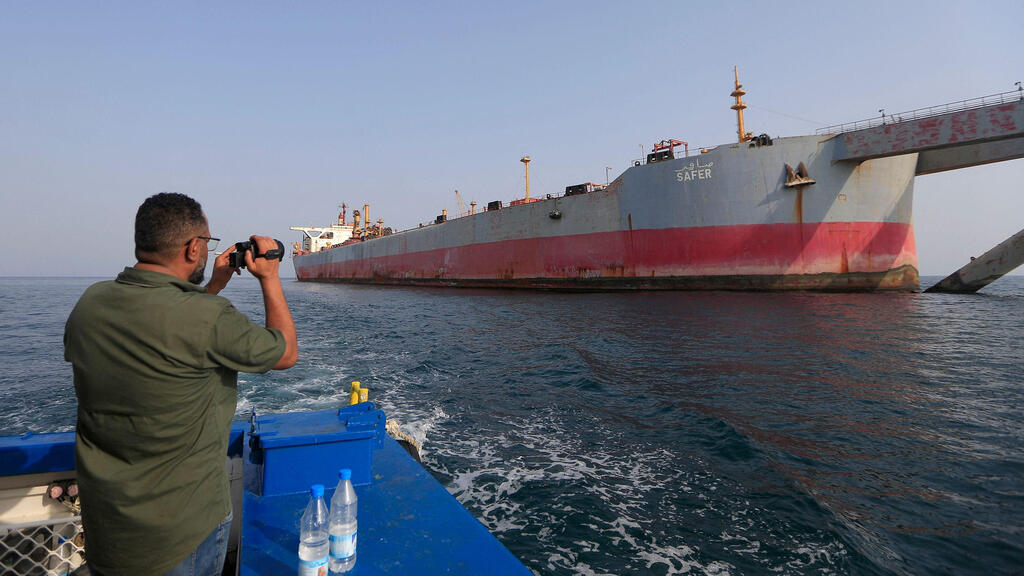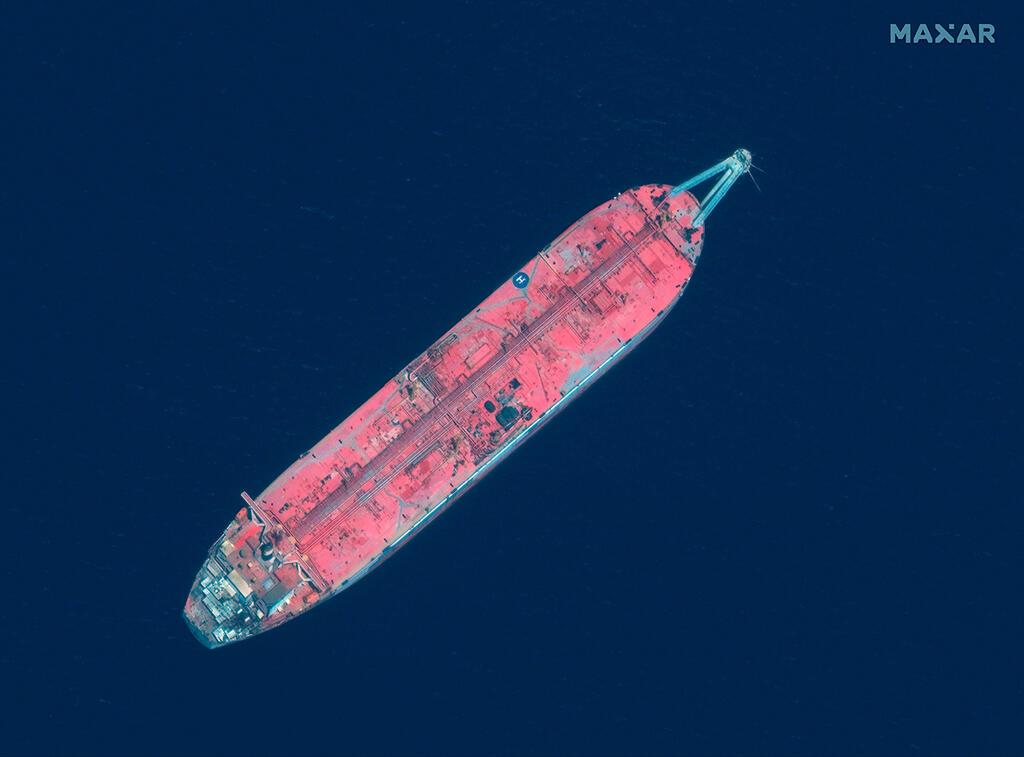The new tanker arriving to the Red Sea as part of the operation
(Video: Reuters)
The eyes of the world have been focused on the Middle East recently due to a "ticking time bomb" that could cause an ecological disaster. The world's largest environmental operation is expected to begin in the coming days in the Red Sea to prevent oil from spilling out from a stranded tanker off the coast of Yemen at the cost of over $129 million and following two years of planning and preparation.
More stories:
Depending on weather conditions, the UN will launch the first operation of its kind to remove the FSO Safer, stranded in the Red Sea, with the participation of hundreds on Thursday or Friday. If the tanker ruptures and the oil spills into the sea, it has the potential of becoming the fifth-largest environmental disaster in history.
According to the UN's plan, skilled workers will transfer more than 1.1 million oil barrels over the next two weeks to an alternative tanker that arrived at the Hudaydah Port in Yemen last week. This complex operation puts many lives in danger, but all agree that the potential oil leak from the decaying tanker, which the Yemeni government acquired in the 1980s, is even more dangerous.
Experts warn that a leak is inevitable, with the potential to devastate one of the world's largest marine ecosystems. Should that occur, the massive oil spill will destroy coral reefs, mangroves and other marine life in the Red Sea, affecting the Israeli resort town of Eilat as well. It will expose millions of people to air pollution and cut off food and fuel supplies for 17 million Yemeni residents – an environmental, humanitarian and economic catastrophe that would befall that nation after years of civil war.
Coastal communities are the most likely to be severely affected by a spill or leak, and hundreds of thousands of jobs in the fishing industry could disappear. According to estimates, it'll take at least 25 years for the fish population in the Red Sea to recover in case of an ecological disaster.
The cost of cleaning the sea alone would be astronomical, reaching as high as $20 billion. However, the UN struggled to secure the $129 million needed to remove the oil barrels from the abandoned tanker - including $55 million for the purchase of an alternative vessel. The UN struggled to raise the needed funds and decided to launch a crowdfunding campaign, which is ongoing, aiming to raise an additional $28 million.
Gaby Goldman, an Israeli consultant for the United Nations Development Programme (UNDP,) is also part of the rescue operation.
The beginning of the ship to ship transfer operation is a huge achievement for the many people across the UN system and also beyond because of so many who have worked tirelessly on this complex and difficult project over months and some would say years to bring us to this point, UNDP head Achim Steiner told Ynet.
"With every gallon of oil now being pumped off the FSO Safer, the threat of a potential oil spill that has loomed over the Red Sea, and the peoples of Yemen and neighboring countries begins to recede, slowly but surely.
"In many ways, it is another practical demonstration of what United Nations can achieve on behalf of humanity in the international community, when it is able to bring its convening power, and ability to deliver results in sometimes extremely challenging environments and contexts.
But even when the ship to ship transfer is complete, there is still critical work to be done, including the installation of a mooring system for the replacement tanker, and the towing away and recycling of the FSO Safer."
The 47-year-old supertanker has been abandoned since the outbreak of the civil war in Yemen eight years ago. It is anchored near the Ras Isa Marine Terminal, controlled by the Iran-backed Houthis, who captured extensive parts of Yemen in 2015. It has not been properly maintained since it was abandoned and is now located in a naval minefield. UNDP experts have raised concerns that it could explode due to gas accumulation or disintegrate in the water due to its lack of maintenance, weakening the vessel's structure.
Over the next two weeks, the oil will be pumped through pipes directly to the alternative tanker, the Nautica. After emptying the oil, a buoy will be attached to the seabed and will serve to secure the alternative tanker until September, when the process will be completed. A technical support vessel currently on-site is ready to intervene in case of oil spills.
And what will happen to the oil afterward? The Houthis and the Yemeni government, supported by Saudi Arabia, are feuding over who owns the ship and who has the right to sell the oil after it is extracted.







